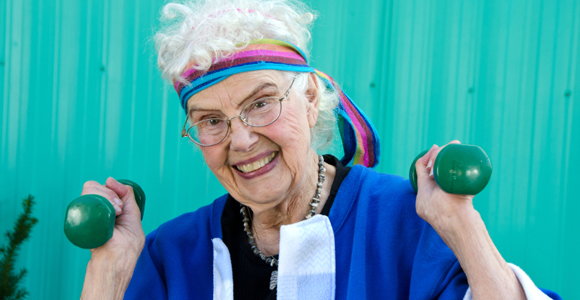If you're huffing and puffing at the gym in hopes of living longer, here's some good news: With a healthy exercise program, you just might cheat death by a few years or even longer. And to those naysayers who claim they'd prefer to enjoy a sedentary existence than a longer one, exercise also improves overall quality of life--preventing the aches, pains and frailty that often plague inactive folks in their silver years.
What the Research Says
According to a study headed by the National Cancer Institute, people who engage in physical activity during their leisure time live as much as 4.5 years longer than their sedentary counterparts. And the more you exercise, the longer you're likely to live.
After accounting for other life-expectancy factors, researchers found that people who got the CDC-recommended 2.5 hours of moderate exercise per week, or just 1.25 hours of vigorous exercise per week, lived an average of 3.4 years longer than non-exercisers. Those who got twice that amount of activity lived an average of 4.2 years longer than sedentary people. Even smaller amounts of exercise appear better than none at all, as people who got just half the recommended amount of exercise extended their lives by nearly two years.
Why Exercise Helps Extend Life
One of the key benefits of exercise is improvement of cardiovascular health. Aerobic activities like walking, jogging and swimming are shown to reduce the risk of heart disease, which is the number-one killer of both men and women in the United States. The activity does this by helping to reduce "bad" LDL cholesterol levels in the blood as well as by lowering blood pressure.
Exercise also helps maintain a healthy weight and improves blood sugar to help prevent diabetes. Weight-bearing activities, which include walking and running but not cycling or swimming, help build bone density for reduced osteoporosis risk, which in turn reduces the risk of dangerous fractures.
Strength-training exercises, which include lifting weights, taking a Pilates class or doing push-ups and lunges, also help combat debilitating conditions that can make old age miserable for some, such as arthritis and back pain. According to the CDC, one study of seniors with moderate to severe osteoarthritis of the knee showed a 43-percent reduction in pain, as well as decreased disability, after just 16 weeks of strength training. In some cases, the exercise worked even better than medication.
Improved Mental Health
Beyond the physical benefits, exercise is good for your sense of well-being. The activity prompts the release of endorphins and other feel-good chemicals in your brain, encouraging happiness while fighting depression. And one study sponsored by the U.S. Department of Veteran's Affairs found that depression shortened life span by nearly five years.
For those who don't fear death, exercise can also help preserve your self-reliance in old age, helping you maintain your dignity along with your independence. Sedentary people are more likely to become feeble, needing help with tasks like carrying groceries and cleaning, and eventually even bathing.
Fortunately, exercise is free for everyone, and becomes enjoyable--even addicting--once you make it a habit. So for a long, healthy life, get out there and start moving.
Will Running Marathons Shorten Your Life?
Nina Kate is a certified fitness nutrition specialist through the National Academy of Sports Medicine (NASM). She also studied journalism at the University of California, Los Angeles (UCLA), and has contributed to numerous major publications as a freelance writer. Nina thrives on sharing nutrition and fitness knowledge to help readers lead healthy, active lives. Visit her wellness blog at BodyFlourish.com.




